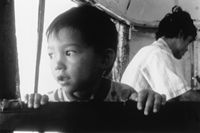
|
 |
Highway
|
FRANCE,
GERMANY / 1999 / Kazakh / Color / 35mm (1: 1.66) / 54 min
Director, Editing: Sergei Dvortsevoy
Photography: Alishef Khamidkhodjaev
Sound: Sarfen Saraibaev
Producer: Chantal Bernheim
Production Company, Source: DUNE
World Sales: Jane Balfour Films
Burghley House, 35 Fortess Road, London NW5 1AQ, UK
Phone: 44-171-2675392 / Fax: 44-171-2674241
E-mail:jbf@janebalfourfilms.co.uk
 |
|
Sergei Dvortsevoy
Born in 1962 in Chimkent, Kazakhstan. After studying aviation in Ukraine,
worked as aviation engineer in Kazakhstan while studying in the radiotechnical
department of the Novosibirsk's Institute. Studied in the Highest
Courses for scriptwriters and film directors in Moscow 1990-93. His
first film, Paradise (1995), won an Award of Excellence at
New Asian Currents YIDFF'97. The film also took prizes in San Francisco,
Nyon, Stuttgart, Kiev, St. Petersburg, Leipzig, and Cinema du Reel
Paris. His second film, Bread Day (1997), also received many
awards and was nominated for the Joris Ivens Prize in Amsterdam in
1998. Highway is his third film. 
|
Highway, the newest work by Sergey Dvortsevoy, a director known
for his unique works like Paradise (1995), which showed in
New Asian Currents at YIDFF '97, and Bread Day (1998), which
received a special jury prize at last year's Taiwan Documentary Film
Festival. This film depicts a family of street performers on the highway
between Central Asia and Moscow in an old bus. The Tajibajev family
- husband, wife and six children from one to 16 years old - travel
through the steppes of Kazakhstan, making their living by performing
in villages and hamlets along the highway; the oldest son hanging
a 32-kilo iron ball from his mouth, and the youngest children walking
on shards of glass. The camera disinterestedly captures the family's
everyday conduct as they eat, rest, perform before meager audiences
and even catch a young eagle at the side of the road. This is what
connects the unique central Asian flow of time and space. What this
unusual description surely proves is that regardless of any violent
social upheaval in the post-Soviet era, daily life goes on.
[Murayama Kyoichiro]
Director's
Statement
Kazakhstan.
A steppe to the horizon.
The sun and the wind.
A Uigur circus family, husband, wife and six kids, from one to 16
years old, travels along the highway from Peking to Moscow by old
bus from village to village, earning their living by performing in
the open air. That's the way, by mere verbiage, I try to start a prescription
of my every new film for a catalogue. I suffer but nothing ever comes
of it. There is nothing interesting in words, describing people cranking
a bus, going along the steppes, eating, sleeping, quarreling and loving
each other. There is nothing sensational here and everything is banal
and boring in words. For a long time I have wondered why this is.
It's not like this on screen, you see. And I've come to understand
that it's silly to describe what is not possible to describe: the
beauty and mystery of everyday life. One must see it only and feel.
Observe together with me quietly and everything will happen. I propose
just that to the audience of my film Highway. |
  |
|
before  next next |
COPYRIGHT:Yamagata International Documentary Film Festival Organizing Committee |